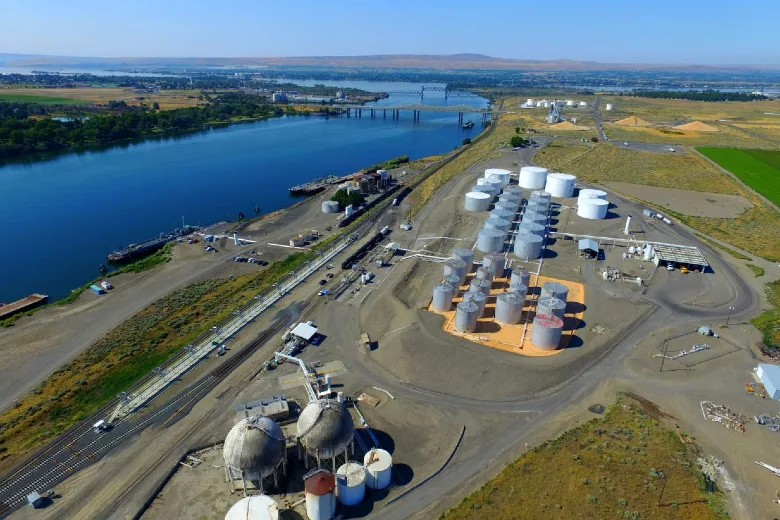Tidewater Transportation and Terminals honored the formal opening of its terminal expansion. This development comprises a thorough biofuel and renewable diesel distribution center at Pasco, Washington’s Snake River Terminal. With a $3.1 million grant from the U.S. Department of Agriculture meant to improve the facility’s capacity, the project attracted notable support.
Increasing the supply of biodiesel across central and eastern Washington, Oregon, and northern Idaho will rely much on the new biofuel distribution hub. The Snake River Terminal’s enlarged capacity means the facility will mix approximately 2 million gallons of biodiesel per month. This project is a component of a larger endeavor to encourage the local change to greener energy sources.
The deliberate location of the plant increases its importance as a distribution center. Its multi-modal access—that which includes linkages between truck, rail, barge, and pipeline—allows for effective biodiesel transportation. During times of maximum agricultural seasons, when energy consumption is highest, this infrastructure is especially essential.
Based on its investments in renewable energy technologies, Tidewater clearly values sustainability. By offering a consistent supply of biodiesel, the opening of the biofuel distribution facility is expected to assist nearby companies and farmers. Tidewater wants to establish itself as a major actor in satisfying Pacific Northwest energy needs as the demand for greener energy substitutes rises.
The growth emphasizes the need of cooperation between the government and business sector in reaching environmental objectives and shows a more general trend towards renewable energy. The money provided by the U.S. Department of Agriculture emphasizes the federal assistance for projects aiming at lower greenhouse gas emissions and better alternative energy sources.
Tidewater officials underlined in the ribbon-cutting ceremony the importance of the new facility in improving the energy scene of the area. Tidewater seeks to encourage local economic development and a more sustainable future by raising the availability of biodiesel, therefore helping the places it serves. Apart from improving the operational capacity of the business, the facility fits the increasing need for renewable energy solutions.
Tidewater’s new biofuel distribution hub marks a major progress in lowering dependency on fossil fuels and supporting greener energy options as the Pacific Northwest keeps giving sustainability first priority. The community, ecology, and economy should all gain from the planned long-lasting investments in this facility.
Ultimately, for Tidewater and the area, the opening of their biofuel and renewable diesel distribution facility represents a turning point. Tidewater is ready to be very important in the Pacific Northwest’s shift to greener energy sources by greatly raising the availability of biodiesel and offering necessary distribution infrastructure. Working with the U.S. Department of Agriculture emphasizes even more the need of government support in advancing projects aiming at environmental responsibility and sustainability.
The IEA claimed, “Emissions reductions in shipping [is driven]… in part by policy changes… suggesting that IMO regulations could also drive energy efficiency improvement in shipping.”
Divergent Suez Canal routes
Separately, the IEA said incremental fuel usage during ship diversions from the Suez Canal to cruise around Africa this year has seen support for bunker demand.
Claiming to defend the Palestinians, Iran-backed Houthi rebels have started over 100 attacks on merchant ships over the Bab al-Mandab Strait since December 2023, therefore many ship operators have chosen longer, safer paths.
The IEA estimates that if all international ships were to avoid or lose access to the Suez Canal, ton-mile demand would climb by over 10%. This would mean that oil demand in shipping might rise by 330,000 b/d in 2024 thus.
Based on the most recent IMF PortWatch statistics, daily ship transits across the Suez Canal averaged 28 in the week ended October 8, almost two-thirds down than the level of 76 year-ago.
Tags: Biodiesel, Biofuels, Energy



Recent Posts
Port of Brisbane Unveils Vision 2060 to Drive Smarter, Cleaner, and More Connected Future
Wärtsilä to Deliver Hybrid Propulsion Systems for Vertom Group’s New Low-Emission Vessels
Latvian port receives electric Konecranes Gottwald Mobile Harbor Crane
Sustainable Ocean Economy Vital for Human Development, Says UNDP at UN Ocean Conference
Green Hydrogen Costs in India Could Drop by 40%, Says IEEFA-JMK Report
Cavotec Secures €1.55 Million Shore Power Contract for Port of Antwerp-Bruges
APM Terminals and SANY Marine sign landmark agreement to accelerate decarbonisation
The Port of Gothenburg takes big step towards shore power connection for container and car/RoRo vessels